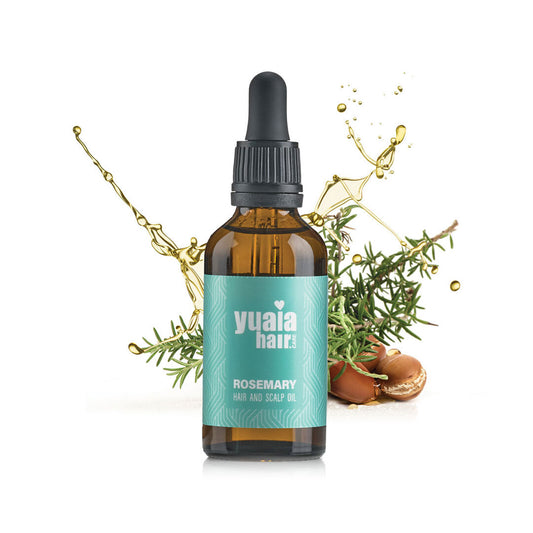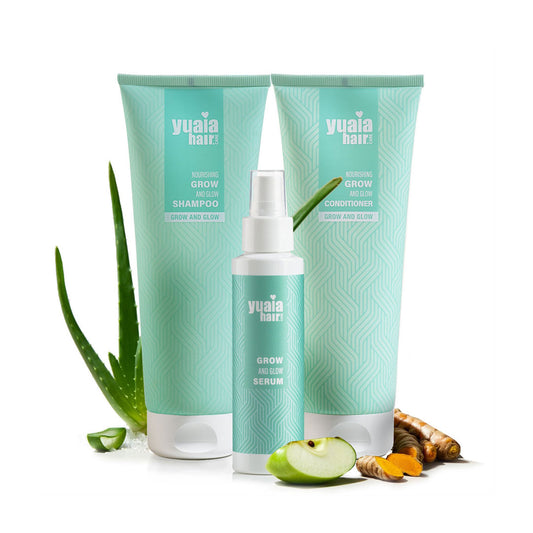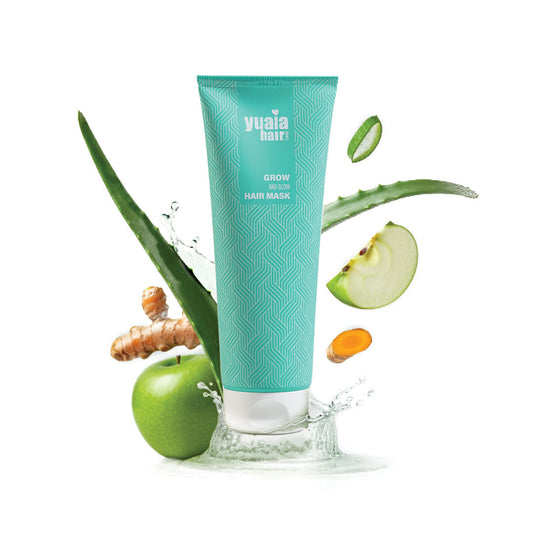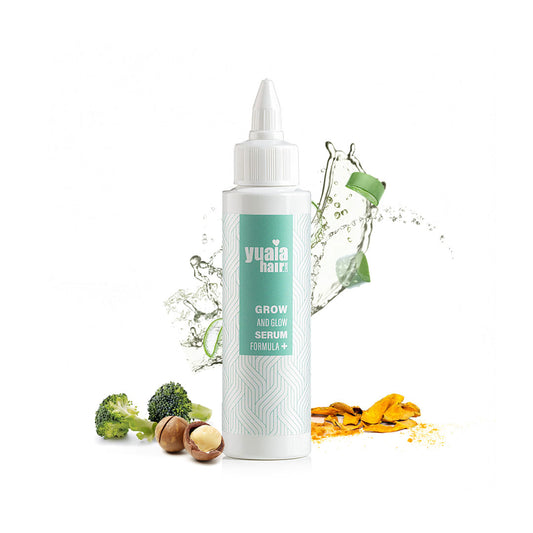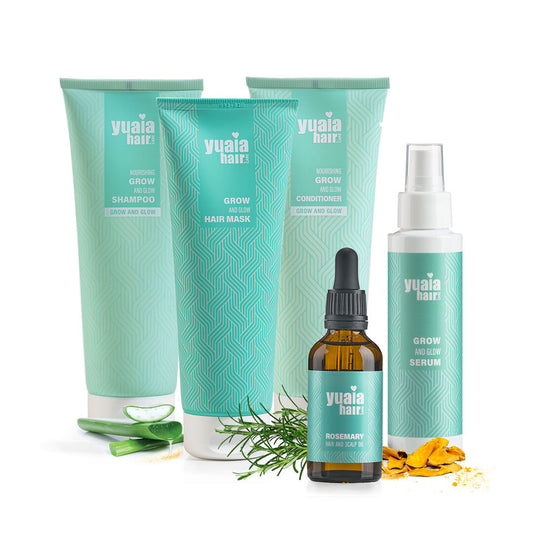
How do I make rosemary oil for hair?
To make your own rosemary oil, you first need to choose the right type of rosemary. Then you can harvest and dry your sprigs before making the oil using either the heat or sun method.
With the heat method, rosemary sprigs are heated with a carrier oil (such as olive or almond oil) at low heat for 4-6 hours. This process quickly extracts the active substances from the rosemary.
The sun method takes longer but is more gentle. Here, the dried rosemary sprigs are placed in a container with carrier oil and then set in the sun for 2-4 weeks. The heat from the sun slowly extracts the rosemary oils.
Rosemary oil is known to improve blood circulation in the scalp, which can stimulate hair growth and strengthen the scalp, making it a good oil for preventing hair loss. Besides this, the oil can also nourish hair and skin and add moisture and shine to your hair.
Once you have made your rosemary oil, it can be applied directly to your hair or mixed with water as a rinse after using shampoo. With its ability to strengthen hair from the roots down, rosemary oil will be your new secret weapon in the quest for healthy and strong hair!

How does rosemary oil work?
Rosemary oil penetrates and stimulates blood circulation in the scalp. This means that oxygen and nutrients are transported out to the hair roots. This can have a beneficial effect on your hair and scalp health.
What are the benefits of using rosemary oil in hair?
Rosemary oil is one of the best things you can use to care for your hair. It has many benefits such as stimulating blood circulation in the scalp and reducing hair thinning, reducing dandruff and itching as well as improving blood circulation to the hair roots and nutrient supply.
Here are some of the amazing benefits of rosemary oil:
- Stimulates blood circulation in the scalp, which can result in increased hair growth.
- Reduces dandruff, itching and scalp irritation
- Improves blood circulation to the hair roots
- Strengthens every single strand of hair from root to tip
Rosemary oil can also help repair damaged hair, especially if the hair has been exposed to heat treatment or chemical treatment.
Another benefit of using rosemary oil for hair is that it also acts as a natural antioxidant, which can help protect the hair from damage caused by free radicals and environmental influences.
So if you want healthy, strong, and beautiful-looking hair, rosemary oil should be your secret weapon!
Scientific evidence for rosemary oil's effect on hair
Scientific evidence for rosemary oil's effects on hair growth is still limited, but there are some studies that suggest its potential benefits. A study published in 2015 indicates that rosemary oil has an effect on the scalp, hair and hair growth.
But it is important to note that the results are not certain knowledge and more research is still needed in the field to further confirm these findings. However, it points in the direction that there is a connection between rosemary oil and hair growth.
It is also worth noting that rosemary oil can have individual effects on different people. Some people may experience a significant improvement in the health and growth of their hair after using rosemary oil regularly, while others may not see any noticeable difference. It is important to be patient and consistent in using rosemary oil to achieve the best results.
Best rosemary hair oil
How to use rosemary oil in hair?
- Rosemary oil is an ingredient that can help give your hair shine and strength. To use it in your hair, you can make your own hair oil by mixing rosemary oil with a carrier oil (e.g. jojoba oil, coconut oil, argan oil or other) Massage the oil into your scalp and let it sit for a few hours before rinsing thoroughly for healthy, shiny hair.
- Add a few drops to your shampoo. If you have fine and thin hair, oils, including rosemary oil, can often cause your hair to clump together and quickly become greasy. A good tip for those with thin and fine hair, but also all hair types in general, is to add a few drops of rosemary oil to your shampoo. This way, you still get the benefits of the rosemary oil without your hair becoming greasy and clumpy. It's also often a good and cheap solution for many instead of investing in an expensive shampoo with rosemary in it. An important tip is to let the shampoo sit in your hair for a while to get the effect of the rosemary oil.
- Another way to use rosemary oil is as part of a homemade hair mask. Mix rosemary oil with other great ingredients such as aloe vera jelly, honey or coconut oil for extra nourishment for your hair. Apply the mask evenly all over your hair and let it sit for 30 minutes before rinsing for revitalised and healthy-looking locks. You can also simply add a few drops along with your favourite regular hair mask.
It's important to realise that hair growth or hair loss reduction is not a quick fix. It takes persistence like anything else, and this is also true when using rosemary oil on your hair. See if you can make it a good habit, make it as easy as possible to remember. Also, remember that on average, hair only grows between 1-2 centimetres per month, so long hair is on its way!

Who should use rosemary oil for hair?
Rosemary oil is a great ingredient for hair care and is suitable for different hair types. It's especially good for those with fine hair as it can help improve texture and make hair fuller. It can be beneficial for different people, especially those with specific hair problems or needs. People experiencing hair loss, baldness or weakened hair may find benefits in using rosemary oil as it is believed to stimulate hair growth and strengthen hair, including by increasing blood circulation in the scalp.
If you suffer from dandruff or an irritated scalp, rosemary oil can also help relieve, minimise and combat these problems. In addition, the oil is also beneficial for those with dry and frizzy hair, as it can help moisturise and add shine to the hair.
Others who can benefit from rosemary oil for hair are those who want to strengthen the hair after coloring or other chemical treatments, as the oil can help repair and care for the hair from root to tip.
So no matter what hair type you have, rosemary oil can be a good investment to achieve healthy and strong hair. However, always remember to test the oil on a small part of the hair first to avoid any allergic reactions.
Side effects of using rosemary oil in hair
Rosemary oil is a potent product, so it is always recommended to use diluted versions of it. As with any natural treatment, there can also be some side effects. It is important to note that reactions can vary from person to person, and some people experience no side effects at all. Here are some potential side effects of using rosemary oil for hair:
Skin irritation: Some people may be sensitive to concentrated essential oils like rosemary oil. Applying too much or in a concentrated way can cause skin irritation, redness or itching. It is always recommended to dilute essential oils with a carrier oil such as jojoba oil or coconut oil to minimise the risk of skin irritation.
Allergic reactions: A rare side effect can be allergic reactions to the components of rosemary oil. This can manifest as itching, rashes or swelling. If you have a history of allergies to similar substances, you should be cautious about using rosemary oil and monitor any reactions.
Dryness: For some people, rosemary oil can have a drying effect on the scalp. This can lead to dryness and dandruff in some individuals, especially if the oil is not properly diluted or if it is used in excess.
In general, it's important to be aware of your own body's reaction and start using rosemary oil in moderation to minimise the risk of side effects. It is also recommended to perform a patch test on a small area of skin to ensure no allergic reactions occur.
How to make your own rosemary oil for hair
Coldpressed Rosemary oil
Purchase of ingredients and equipment:
Before you can make your own rosemary oil for hair, you need the following ingredients and equipment:
- Dried rosemary
- A base oil (eg jojoba oil or almond oil)
- An airtight bottle
- A cloth or filter
Recipe for homemade rosemary oil for hair:
Making your own hair oil with rosemary oil is easier than you think! Follow this simple recipe:
1. Put dried rosemary in an airtight bottle with your base oil.
2. Leave it for about a month in a dark room.
3. Strain the mixture over a cloth or filter to remove all the small pieces.
4. Pour the oil into an airtight bottle.
Storage and durability of the oil:
To keep your hair oil fresh, it should be stored in a cool, dark place away from direct sunlight. The shelf life of your homemade rosemary oil will vary depending on the type of base oil used, but in general it should be able to stay fresh for at least six months - just be sure to close the bottle tightly each time after use!

Hot pressed rosemary oil
Ingredients and equipment:
- Dried rosemary
- A base oil such as argan oil
- A saucepan
- A bowl
How to use:
Take a decilitre of base oil in a bowl, you can add more if needed. Add the dried rosemary leaves to the bowl and mix together. Bring a pot of water to the boil. Place the bowl with the oil over the pan and leave it there for about 15 minutes. Allow the oil to cool and then strain it into a glass jar with a lid. Boom, you've made your very own rosemary oil for your hair.
How to make rosemary water for your hair:
If you are looking for an easy and natural way to give your hair a healthy and refreshing boost, then rosemary water is the perfect choice. Rosemary water is known for its many benefits for hair, including stimulating blood flow, reducing dandruff and improving hair shine. Here is a simple recipe on how to make your own rosemary water at home:
1. Start by taking a handful of fresh or dried rosemary and place it in a pot.
2. Pour two cups of water into the pan and bring to a boil.
3. Let it simmer for about 15-20 minutes, until the water has acquired a strong rosemary scent.
4. Turn off the heat and let the rosemary water cool in the pan for about 10 minutes.
5. Once cooled, carefully pour the rosemary water through a strainer or cloth to remove the rosemary leaves.
6. Pour the rosemary water into an airtight bottle and store in the fridge.
How to use rosemary water in hair:
Rosemary water can be used as a hair conditioner after washing. You can either rinse your hair with rosemary water after shampooing, or you can pour it into a spray bottle and use it as a leave-in conditioner. Gently massage it into the scalp and hair and let it dry naturally. The rosemary water will moisturize and nourish your hair, leaving it shiny and healthy. An added benefit of using rosemary water as a leave-in is that it does not weigh the hair down, making it ideal for those with fine hair who want to avoid heavy products.
Other benefits of rosemary water:
Apart from being good for your hair, rosemary water also has many other benefits. It is said to be able to relieve itchy or irritated scalp, help blood flow to the hair roots. It can also help fight dandruff and provide a soothing and relaxing effect.
Rosemary water can even be used as a refreshing facial toner, as it has anti-inflammatory properties that can help reduce redness and irritation on the skin.
So next time you want to give your hair a natural and healthy treatment, why not try making your own rosemary oil or rosemary water.
What is the difference between rosemary oil and rosemary water for hair?
The difference between rosemary oil and rosemary water lies primarily in their composition and use for hair.
- Rosemary oil is usually extracted by steam distillation of rosemary leaves. It contains concentrated essential oils from the rosemary plant. Rosemary oil is more concentrated and often requires dilution with a carrier oil to avoid skin irritation.
- Rosemary water, also known as rosemary infusion, is obtained by steeping rosemary leaves in water. The resulting product is not as concentrated as rosemary oil. Rosemary water can be more gentle and used directly on the hair and scalp without further dilution. Rosemary water is often used as a milder alternative to rosemary oil. Rosemary water is also said to have similar benefits to rosemary oil, but in a milder form.

Can you mix rosemary oil with other oils for hair care?
Yes, you can easily mix rosemary oil with other oils for hair care. Rosemary oil is known to be a great ingredient for promoting healthy and strong hair, but it can also be combined with other oils for even better results.
Some oils that are good to mix with rosemary oil for hair care are, for example, jojoba oil, argan oil or coconut oil. These oils add extra nourishment and moisture to the hair while strengthening and protecting it.
When you mix the oils, you can either use them as a hair mask, where you massage the oil into the hair and leave it on for 30 minutes before rinsing it out, or you can use the oil as a leave-in treatment, where you simply apply the oil in the ends of the hair after washing.
Another advantage of mixing rosemary oil with other oils is that you can tailor the treatment to your specific hair needs - for example, argan oil can add extra shine, while coconut oil provides deep moisture.
It is important to remember that the oil should be of good quality and not contain any harmful chemicals, as this can have a negative effect on your hair. Make sure to research the oils you use before applying them to your hair.
Using rosemary oil as part of a hair mask
An effective hair mask with rosemary oil requires only a few ingredients, all of which are readily available. Mix an appropriate amount of rosemary oil with a little olive oil and honey to create a nourishing mask. Use this mask on your hair regularly to give it strength, shine and vitality.
Step-by-step instructions for using the hair mask include applying the mask evenly all over the hair from roots to ends. Gently massage into the scalp and leave the mask on for at least 30 minutes before rinsing thoroughly with warm water. For best results, repeat the process at least once a week and maintain the healthy balance of your hair using natural products like rosemary oil.

How to choose the right rosemary oil?
When choosing the right rosemary oil, it is important to know the ingredients. Choose an oil made from natural ingredients to avoid harmful chemicals in your hair care product.
Also consider the purpose of using the oil. Do you want to use the oil as a hair care product or as part of your aromatherapy routine? This will help you choose the right type of rosemary oil that best suits your needs.
For further help, you can evaluate reviews from other customers to find out if the oil lives up to its claims and has positive results on the hair. When you take these factors into consideration, you can make an informed decision about choosing your next rosemary oil hair product!
3 tips for using rosemary oil in your hair
-
Make sure to use rosemary oil on the scalp. When applying rosemary oil to your hair, always apply it to your scalp. The oil only works well on the scalp, where it can be allowed to work. Therefore, it's best to apply it in shampoos, serums or via spray on the scalp.
-
Give it plenty of time. For the oil to work properly, remember to give it plenty of time to work on the scalp. We recommend between 30 minutes to 1 hour before washing it out again.
-
Use only a small amount. Rosemary oil is often a powerful concentrate, so it is only necessary to use a small amount to achieve the desired effect. If you want to promote hair growth, you can also combine rosemary oil with a carrier oil like coconut oil for a gentler application while getting all the benefits of both oils.
What alternatives are there to rosemary oil?
If you are thinking about whether you should try rosemary oil for your hair or whether there are other ways to achieve your desired result, there are a few things you can consider.
Peppermint oil
Peppermint oil contains menthol, which can increase blood circulation to the scalp. This improved circulation can help promote hair growth and also help keep hair follicles healthy and strong.
Lavender oil
Besides its calming scent, lavender oil also has properties that can help improve hair condition. It is said to reduce hair loss and strengthen the hair shaft, which can lead to healthier and more vibrant hair.
Eucalyptus oil
Eucalyptus oil has antibacterial and anti-inflammatory properties that can be beneficial for the scalp. By reducing inflammation and fighting bacteria, eucalyptus oil can help create a healthy environment for hair growth.
Rosemary tea
Using rosemary tea as a rinse after hair washing can also be an effective way to benefit from its properties. Rosemary contains antioxidants and nutrients that can promote hair growth and improve hair health when used regularly.
Coconut oil
Coconut oil is rich in nutrients and fatty acids that can penetrate deep into the hair shaft and help strengthen and nourish hair. It can also help to improve hair elasticity and prevent damage, which can promote normal hair growth.

Argan oil
Argan oil is known for its moisturising properties and high content of vitamin E, antioxidants and fatty acids. It can help repair damaged hair, protect against free radicals and promote normal hair growth.
Almond oil
Almond oil is light and easily absorbed by the hair and scalp. It is rich in vitamins and minerals that are essential for healthy hair growth, including vitamin E, magnesium and zinc. Almond oil can also soothe and moisturise the scalp, promoting optimal conditions for hair growth.
Jojoba oil
Jojoba oil naturally resembles hair's own sebum and can help regulate sebum production on the scalp. It can also penetrate deep into the hair shaft and strengthen hair from the inside out, resulting in stronger and healthier hair.

Find hair care products with Capilia Longa
Capilia Longa has been shown in a study to be able to reduce hair loss and increase hair growth. Capilia Longa is made as an extract from turmeric and has pleased many of our customers! You can find it in our entire grow and glow series, which, among other things, is also super good for irritated scalps! The Grow and glow range is especially good for those with thin and fine hair who want more volume in their hair. The range is free of sulphate and silicone, is colour protecting and contains a number of ingredients that help promote hair growth and reduce hair loss. You could consider adding a few drops of rosemary oil to your shampoo, for example, to get the effect of rosemary oil.
A good tip to boost the effect of the Grow and Glow series is to add a few drops of rosemary oil in, for example, the shampoo to take advantage of rosemary oil's strengthening properties that can supplement Capilia Longa's effect.
Hair mask with both Rosemary and Capilia Longa
The Grow & Glow range also includes a hair mask. It is filled with ingredients that both nourish and strengthen the hair. It contains Rosemary Leaf Extract, Capilia Longa and Amaranthus Caudatus Seed Extract, which are all known for their strengthening properties for the hair. In addition, there is also hydrolysed wheat protein and keratin, which help to repair the hair and give it care and moisture. In other words, you really do get a hair mask that has it all.
Frequently asked questions about rosemary oil
How long should I leave rosemary oil in my hair?
When using rosemary oil in your hair, you can choose to leave it in for different periods of time depending on your needs and preferences:
Short time: If you only want to add a light scent of rosemary to your hair or want to enjoy the moisturising benefits of the oil without having to rinse it out, you can leave it in your hair for around 30 minutes to 1 hour. This gives the oil time to absorb into the hair but doesn't require long exposure time.
Long time: If you want to achieve more intensive benefits from rosemary oil, such as promoting hair growth or improving scalp health, you can leave the oil in your hair for longer. Some people leave the oil in their hair overnight by applying it before bed and then covering their hair with a shower cap or towel to prevent the oil from rubbing off on the pillow.
No matter how long you choose to leave the rosemary oil in your hair, it's important to remember to rinse it out thoroughly after use to avoid oil build-up and to keep your hair from looking greasy. You can use a mild shampoo to rinse out the oil and follow up with conditioner if needed to leave your hair soft and shiny.
How often should you use rosemary oil for hair?
The frequency of applying rosemary oil to your hair can vary depending on your specific needs and the condition of your hair. In general, consider the following guidelines:
Weekly application: If you're using rosemary oil to improve the overall condition of your hair, moisturise it and promote a healthy scalp, applying the oil once a week may be sufficient. This can help maintain hair health and prevent dryness.
More frequent use: If you have specific scalp issues, such as dandruff or itchiness, or if you want to stimulate hair growth, consider using rosemary oil more frequently, such as two to three times a week. This can help address specific issues and maximise the benefits of the oil.
Less frequent use: If you have normal or oily hair, using rosemary oil less frequently, such as every two weeks, may be sufficient. This can help avoid oil build-up and keep hair light and fresh.
It's important to listen to your hair and scalp's reaction to the oil and adjust the frequency of application accordingly.

How do you wash rosemary oil out of hair?
Washing rosemary oil out of your hair requires a thorough approach to ensure the oil is removed effectively. Here are the steps you can follow:
- Preparation: Start by moistening your hair with warm water. This helps open the hair shaft and makes it easier for the shampoo to remove the oil.
- Use plenty of shampoo: Apply a generous amount of your favourite shampoo to your hair. Massage the shampoo thoroughly into the scalp and through the hair to ensure the oil is dissolved and rinsed out.
- Focus on the scalp: Concentrate on massaging the shampoo thoroughly into the scalp, where rosemary oil often accumulates the most. Use your fingertips to gently massage in circular motions to loosen the oil and remove impurities.
- Repeat if necessary: If your hair still feels greasy or oily after the first shampoo, repeat the process once or twice more. Repeating may be necessary to remove all the oil.
- Rinse thoroughly: Rinse your hair thoroughly with warm water to remove all shampoo and oil. Make sure there is no residue left as this can leave your hair feeling heavy and greasy.
- Use conditioner if necessary: If your hair feels dry or parched after shampooing, apply a light conditioner to the lengths and ends of your hair to restore moisture.
- Air dry or style: Let your hair air dry or style it as needed.
By following these steps carefully, you can effectively remove rosemary oil from your hair and achieve a clean and fresh feeling.

What should rosemary oil be mixed with?
Rosemary oil can be mixed with a variety of other oils or ingredients to create different hair and skin care products. Here are some popular options:
- Carrier oils: Carrier oils such as coconut oil, almond oil, jojoba oil or argan oil can be mixed with rosemary oil to dilute it and make it easier to apply to the skin or hair. These oils also contribute their own benefits such as hydration, nourishment and hair strengthening.
- Essential oils: In addition to using rosemary oil in hair, you can also add other essential oils such as lavender oil, peppermint oil, or tea tree oil to create a fragrant and beneficial blend. These essential oils each have their own benefits for hair and skin and can enhance the overall effect of the product. A combination of rosemary oil with lavender oil can, for example, help soothe the scalp, while peppermint oil can stimulate blood circulation.
- Natural ingredients: You can also mix rosemary oil with other natural ingredients such as honey, aloe vera gel, yoghurt or egg whites to create homemade hair or face masks. These ingredients can add additional nourishment and moisture to the skin and hair.
- Rinses: Rosemary oil can also be diluted in water or apple cider vinegar to create a rinse that can be applied after hair washing. This can help add shine, strengthen hair follicles and stimulate hair growth.
When mixing rosemary oil with other ingredients, it's important to follow recipes and recommendations for correct proportions for best results and to avoid irritation or discomfort.
Is rosemary oil good for dandruff?
Yes, rosemary oil is effective against dandruff. It has natural antimicrobial and anti-inflammatory properties that combat fungal infections and inflammation, which are often the causes of dandruff. With regular use, rosemary oil can reduce irritation, dryness, and flakes on the scalp.
To maximize its effect against dandruff, you can also mix rosemary oil with tea tree oil, which has strong antifungal properties that can further soothe the scalp.
A hair mask with rosemary oil can also help restore balance to the scalp and reduce dandruff symptoms over time.
How to use rosemary oil for dandruff:
Dilute rosemary oil with a carrier oil such as coconut oil or jojoba oil. Massage the mixture into the scalp and leave it on for at least 30 minutes before washing your hair with a mild shampoo. This moisturises the scalp and reduces dandruff. You can also add a few drops of rosemary oil to your shampoo and leave it in your hair for a few minutes before rinsing. Alternatively, you can make a hair mask by mixing rosemary oil with honey and yoghurt, apply it to the scalp and leave it on for 20-30 minutes before washing.
Benefits of rosemary oil for dandruff:
- Antimicrobial Properties: Fights microorganisms that cause dandruff.
- Anti-inflammatory Properties: Reduces inflammation and irritation.
- Moisturising: Moisturises a dry scalp, reducing flaking and itching.
 2-5 day delivery
2-5 day delivery
 25.000+ satisfied customers
25.000+ satisfied customers
 Satisfaction Guarantee
Satisfaction Guarantee



















